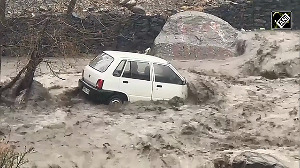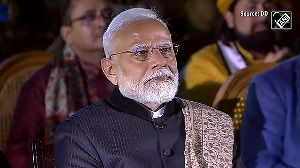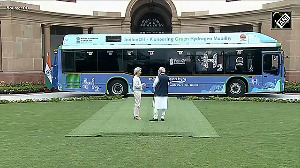Prime Minister Manmohan Singh's clarion call on December 20 at the high level conference to discuss internal security to crush the Naxalites, now up in arms in several states, brought to mind a line from Zafar Gorakhpuri's popular qawwali featured in the 1972 movie Putli Bai. It runs: "Inke kalai dekho tho chudiyan uthane ke kabhil nahi, phir bhi talwar uthane ki dhamki " (See their waist and they look incapable of lifting a bangle, but still the threat is to pick up a sword).
I am not alluding to the weight of the PM's kada but to the worn out sinews of the state that are hardly capable of quelling any armed assault upon it let alone assuaging the causes that force normally compliant people to resort to violence. Having traveled several times through the 'affected' areas in Andhra Pradesh, Chhattisgarh, Madhya Pradesh and Maharashtra I have little hesitation in testifying that the insurgency has much popular support. The police, forest and excise departments are truly hated and this is just about all the government the common people encounter.
The prime minister has a typical bureaucratic response to this major crisis now gripping the adivasi homelands in six states. The government will now raise 25 more battalions of armed police, mostly for the Central Reserve Police Force. It is unfortunate that the prime minister sees this as a law and order problem. One would have thought Manmohan Singh was more intelligent than that because more coercion by the state will only beget more against it by the people. It seems that, let alone intelligence, even common sense and good sense are kept out of that corner of South Block which houses the Prime Minister's Office?
It seems that the prime minister threat of more forces found favorable response with all the participants of the conference which included the Congress, the Communist Party of India-Marxist and Bharatiya Janata Party chief ministers. In his closing remarks, Dr Singh said conferences of this nature send a strong message that the "political leadership of the country can rise above our political and party affiliations when it comes to facing national challenges, particularly those concerning internal security." It seemed that the entire national political spectrum was not just speaking but thinking as one. Groupthink is a serious psychological disorder and means that when all are thinking alike nobody is really thinking. Signs of it among the nation's top leaders are an ominous portent of things to come.
The spread of Naxalism is an indication of the sense of desperation and alienation that is sweeping over of large sections of our nation who have been not only systematically marginalised but cruelly exploited and dispossessed in their last homelands. The late Professor Nihar Ranjan Ray, one of our most distinguished historians, described the central Indian adivasis as "the original autochthonous people of India" meaning that their presence in India pre-dated the Dravidians, the Aryans and whoever else settled in this country. The anthropologist Dr Verrier Elwin states this more emphatically when he wrote: "These are the real swadeshi products of India, in whose presence all others are foreign. These are ancient people with moral rights and claims thousands of years old. They were here first and should come first in our regard."
Unfortunately like indigenous people all over the world, the India's adivasis too have been savaged and ravaged by later people claiming to be more 'civilised'.
In the decades after Independence the exploitation has only become more rampant. The adivasi homelands are rich in natural resources and the new modernising and industrialising India needs these resources. Today all the mineral resources except oil that India boasts off are to be found only in these areas and the state has not been lax in exploiting them. The only problem is that the people whose homelands were ravaged to extract nature's bounty got little or nothing of it. Even the meager royalties the states receive are mostly expended by the authorities on themselves as salaries have now become the biggest single expenditure of the Indian states. At last count the total wage bill of India's government is a monstrous Rs193,000 crore or about 5.6 percent of the Gross National Product.
We all now know very well that big government in the absence of a responsive nervous system actually means little government, and whatever little interaction the people at the bottom have with the state is usually a none too happy one. In the vast central Indian highlands the occasional visit of an official invariably means extraction by coercion of what little the poor people have. It doesn't just end with a chicken or a goat or a bottle of mahua (the local brew), it often includes all these and the modesties of the womenfolk. Most tribal villages and settlements have no access to schools and medical care. Very few are connected with all weather roads. Perish the thought of electricity though all the coal and most of the hydel projects to generate electricity are in the tribal regions. The forests have been pillaged and the virgin forests thick with giant teak and sal trees are things of the past.
In Orissa over 72 percent of all adivasi's live well below the poverty line. At the national level 45.86 percent of all adivasis live below the poverty line. Incidentally the official Indian poverty line is a nothing more than a starvation line, which means that almost half of India's original inhabitants go to bed every night starving. Several anthropometric studies have revealed that successive generations of adivasi's are actually becoming smaller unlike all other people in India who benefit from better and increasingly nutritious diets.
What little the Indian state apportions to the welfare and development of indigenous people gets absorbed in the porous layers of our government. A typical instance of this is in the tribal majority KBK (Kalahandi, Bolangir and Koraput) districts of Orissa where over Rs 2,000 crore cumulatively spent ostensibly on social welfare and rural development schemes during the past three years has just vanished leaving little or no evidence of having done any of the intended recipients any good. The people are not having any more of it and have taken to coercing the state, dishing out to it what its minions have been doing for ages.
The armed police first went into Bastar, now in Chhattisgarh in 1966. The Gond people in Bastar revolted against the corrupt and exploitative ways of the Madhya Pradesh Congress government of D P Mishra. Pandit D P Mishra, a Sanskrit scholar of some repute, had few qualms in unleashing the police on the adivasis who congregated in Jagdalpur to pay the customary Dussera homage to their Raja, Pravinchandra Bhanjdeo. Not only did the MP police kill scores of adivasis, but they also shot down the Raja in cold blood.
Soon after this incident central forces were deployed in Bastar and one got a first hand look at the havoc they wrought. The military only repeated what they had done in the Naga Hills. In those days the armed forces used Lee Enfield .303 rifles and the adivasis used bows and arrows and the occasional muzzle loading gun. With the advent of the AK-47 capable of delivering over 650 rounds per minute combined with an intimate knowledge of the terrain, the Naxalites, now mostly adivasi volunteers, are not as disadvantaged as before. In the recent months the police have been at the receiving end and the prime minister is a worried man.
During my last visit to Bastar, I drove down from Narayangarh to Chota Dongar, deep in the jungles. The only sign of the state here were the pockmarked buildings that once housed government offices. At the village haat (bazaar) at Chota Dongar, as we stood watching cockfights a Naxal patrol quietly came along and took talashi (search) of our vehicle. They had a few good laughs over the cartons of mineral water we were carrying but refused to pose for pictures.
Two days prior to this the vehicle was stopped and searched in Andhra Pradesh's Warangal district by an armed police patrol. The sub-inspector leading the team was drunk, as were most of his men. The first question was whether we were carrying firearms? Then they wanted to know how much cash we were carrying? Then things got a bit hairy. They wanted to know as to how we had entered the forest area without 'permission'. One got the distinct feeling that only our facility with English and the Delhi license plates prevented an encounter. And now Dr Singh is proposing 25 more battalions of such fine fighting men to defend our democratic way of life and to uphold the Constitution?
Quite clearly the solutions lie elsewhere. There are several paradoxes that must be dealt with. The most important of these is that to provide good government in the worst of law and order environments. A better civil administration structure must come up in place of the one sent packing by the violence and by popular sanction. Instead of the state capital controlled government the instruments of government dealing with education, health, irrigation, roads and land records must be handed over to local government structures.
The police must also be made answerable to local elected officials and not be a law unto themselves. The local community must get all the royalties for the minerals extracted from their areas. We cannot have any more episodes like that in Kalinganagar where the Tata's got adivasi lands at a fraction of their market value. Tata's and others want to exploit Bastar's iron ore. They must pay the full value of this to the local community.
When Dr Singh first became prime minister, he promised that the reform of government was his number one priority. He promised us a government by the people and for the people. Instead of devoting himself to this he seems to have frittered his time schmoozing with the fat cats of the Confederation of Indian Industries and the World Economic Forum and running a government for them alone.






 © 2025
© 2025